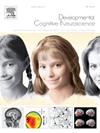社交媒体使用和青春期对静息状态皮层活动和心理健康症状的互动影响
IF 4.6
2区 医学
Q1 NEUROSCIENCES
引用次数: 0
摘要
青春期是一个深刻的生物社会心理发展时期,随着同伴环境中社会需求的增加,青春期驱动的神经重组。社交媒体使用的爆炸性增长从根本上改变了年轻人之间的同伴互动,迫切需要了解其对神经生物学发展和心理健康的影响。现有文献表明,使用社交媒体会促进青少年的社会比较和反馈寻求(SCFS)行为,这预示着心理健康障碍的风险增加,但对其对神经生物学发育的影响知之甚少。我们使用脑磁图(MEG)评估了80名典型发育青少年(8-16岁)的社交媒体行为、心理健康症状和自发皮层活动,并测试了自我报告的青春期阶段如何调节它们之间的关系。参与更多SCFS的成熟青少年表现出较弱的梭状回/海马旁α和内侧前额叶β活动,并增加焦虑和注意力问题的症状。因此,青少年在社交媒体上进行SCFS可能与青春期经历相当发育的大脑区域的发育差异有关。这些结果与表明在许多精神健康障碍的发病周围的关联皮层内改变神经发育轨迹的工作是一致的。重要的是,青春期后期可能对社交媒体使用的有害影响最为敏感。本文章由计算机程序翻译,如有差异,请以英文原文为准。
Interactive effects of social media use and puberty on resting-state cortical activity and mental health symptoms
Adolescence is a period of profound biopsychosocial development, with pubertally-driven neural reorganization as social demands increase in peer contexts. The explosive increase in social media access has fundamentally changed peer interactions among youth, creating an urgent need to understand its impact on neurobiological development and mental health. Extant literature indicates that using social media promotes social comparison and feedback seeking (SCFS) behaviors in youth, which portend increased risk for mental health disorders, but little is known about its impact on neurobiological development. We assessed social media behaviors, mental health symptoms, and spontaneous cortical activity using magnetoencephalography (MEG) in 80 typically developing youth (8–16 years) and tested how self-reported pubertal stage moderates their relationship. More mature adolescents who engaged in more SCFS showed weaker fusiform/parahippocampal alpha and medial prefrontal beta activity, and increased symptoms of anxiety and attention problems. Engaging in SCFS on social media during adolescence may thus relate to developmental differences in brain regions that undergo considerable development during puberty. These results are consistent with works indicating altered neurodevelopmental trajectories within association cortices surrounding the onset of many mental health disorders. Importantly, later pubertal stages may be most sensitive to the detrimental effects of social media use.
求助全文
通过发布文献求助,成功后即可免费获取论文全文。
去求助
来源期刊

Developmental Cognitive Neuroscience
NEUROSCIENCES-
CiteScore
7.60
自引率
10.60%
发文量
124
审稿时长
6-12 weeks
期刊介绍:
The journal publishes theoretical and research papers on cognitive brain development, from infancy through childhood and adolescence and into adulthood. It covers neurocognitive development and neurocognitive processing in both typical and atypical development, including social and affective aspects. Appropriate methodologies for the journal include, but are not limited to, functional neuroimaging (fMRI and MEG), electrophysiology (EEG and ERP), NIRS and transcranial magnetic stimulation, as well as other basic neuroscience approaches using cellular and animal models that directly address cognitive brain development, patient studies, case studies, post-mortem studies and pharmacological studies.
 求助内容:
求助内容: 应助结果提醒方式:
应助结果提醒方式:


